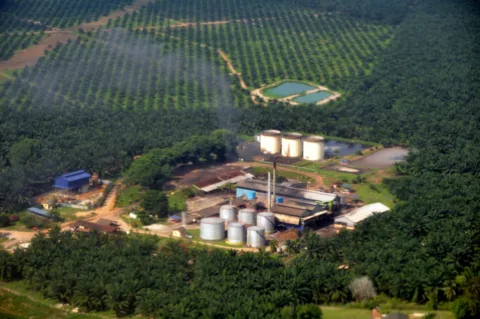I’ve been hearing a lot about palm oil these days.
It seems like a lot of folks are saying we shouldn’t use palm oil products anymore.
Being from Florida, where palms are ubiquitous with many beaches and tourist spots, I was curious why I’ve been hearing so many people saying I shouldn’t use it.
I started wondering… “Palm oils? Where do they use palm oils?”
A little research helped me find out exactly where palm oil is used.
The answer: Palm oil is used in just about everything! (Well, almost.)
According to Green Palm Sustainability:
Semi-solid at room temperature, palm oil and palm kernel oil are among the world’s most versatile raw materials. Their functional product properties remain one of the main drivers behind the rise in demand for palm oil since the 1980s.
Palm Oil Products
Here’s just a partial list of products you might encounter that could contain palm oils:
- Foods and snacks — such as chocolate, pizza dough, and instant noodles
- Biofuel and energy products
- Animal feed and pet food
- Personal care products — like soap and shampoo
- Cosmetics and pharmaceutical items
Wow, and that’s just the beginning. You see, palm oil is labeled under many different aliases.
You could find palm oils identified on food and ingredient labels as any of the following:
- Vegetable Oil
- Vegetable Fat
- Palm Kernel
- Palm Kernel Oil
- Palm Fruit Oil
- Palmolein
- Palmitate
- Palmate
- Palmitic Acid
- Stearate
- Palm Stearine
- Glyceryl
- Elaeis Guineensis
- Palmitoyl Oxostearamide
- Palmitoyl Tetrapeptide-3
- Sodium Lauryl Sulfate
- Sodium Laureth Sulfate
- Sodium Kernelate
- Sodium Palm Kernelate
- Sodium Lauryl Lactylate/Sulphate
- Etyl Palmitate
- Hyrated Palm Glycerides
- Palmitate Alcohol
- Octyl Palmitate
Wowsers… So, pretty much if you see the root “pal” anywhere on a food label, it probably contains palm oils or some form of palm oil.
I’m sure the folks who work with palm oil are concocting many other forms of palm oils and creating many brand new, multi-syllabic palm-based ingredient names for us to look for in the future, too.
So Why Is Palm Oil Bad, Anyhow?
Unable to remember umpteen thousand different ingredients to be watching for while hurriedly looking at product labels at the grocery store, I wanted to know: What’s the big deal about palm oils, anyway?
Well, turns out it really is a big deal!
Palm oils are harvested from palms. And the way they’re grown is on massive, tropical, and subtropical farms.
While palm farms may sound pleasant to you (especially if you’re shivering cold in a northern town somewhere during the winter), they often turn up on lands that were formerly forested. Deforestation is one of the biggest concerns connected to the growing use of palm oils.
Of particular concern is rain forest destruction — which is running rampant throughout swaths of South America, Indonesia, and other equatorial regions.
Many animals are being pushed out of their native habitats, forced to live in areas where they have a harder time surviving — if at all. For example, the Sumatran orangutan is nearing extinction in Indonesia, while the Lear’s Macaw of Brazil is on the brink of disappearing. Many other rainforest animals are also seriously threatened.
There are efforts underway to increase the use of more sustainable palm oil farming.
Still, the rate at which deforestation is occurring across the world due to the increasing use of palm oils is troubling.
Rainforest animals aren’t the only creatures threatened by deforestation due to the increase in palm oil farming and other agricultural development.
Humans, too, could be at risk — as atmospheric carbon dioxide (CO2) levels rise due to the destruction of rain forests and other wooded lands and implementation of palm oil farming practices.
Rising CO2 levels have been linked by thousands of earth scientists to global warming — which can cause:
- ocean levels to rise;
- expansion of deserts and other hostile climate regions; and
- more erratic weather patterns.
Is Palm Oil Bad For Your Health?
If palm oil is bad for the environment, is it also bad for your health?
The simple answer is palm oil is better for you than some oils, but worse than others.
One reason palm oils have increasingly been used in foods is that they serve as healthier replacements for trans fats — which the U.S. Food and Drug Administration is banning in 2018.
Trans fats are already banned in some U.S. cities, and they’ve all but disappeared from most common food products. However, in place of trans fats are other forms of saturated fat — including palm oils.
 According to the Union of Concerned Scientists:
According to the Union of Concerned Scientists:
As companies have begun to reduce their reliance on partially hydrogenated vegetable oils in response to forced labeling and health concerns, palm oil has been a preferred replacement oil for food manufacturers because unlike most vegetable oils, is a solid at room temperature. This is due to the high degree of saturation of palm oil, which also has implications for health.
Those health implications may include:
- Possible increase in LDL (bad) cholesterol
- Hypertension, especially caused by heated palm oil
- Cancer, as posed in European scientific findings that palm oil or its byproducts may be carcinogenic
There are also claims that palm oils offer health benefits, including:
- Increase of energy levels — Palm oils contain beta-carotenes, which can bolster energy levels and hormones.
- Helping cardiovascular health — Remember just above where it’s mentioned palm oils may raise LDL levels? Conversely, it can also raise HDL (good) cholesterol levels.
- Prevention of cancer — Here’s another palm oil health conundrum: while some scientists say palm oil or components of palm oils, could contain carcinogens, palm oils also contain antioxidants known as tocopherols.
- Improvement of vision health — Because palm oils contain antioxidants and beta-carotene, this tropical substance can also help the eyes and may stave off cataracts and macular degeneration.
So, Is Palm Oil Safe To Eat?
The best way to answer this question — given what we know now — is that it’s probably no more or less dangerous than other forms of saturated fat.
It’s probably ok in moderation for most people, but harmful in larger quantities.
I have a hunch we still have more to learn about palm oils, their effect on the environment, and how palm oil impacts our physical health.
Stay tuned!
More Info About Palm Oil
In addition to the links I’ve included above, here are some other resources to help you decide if you want to incorporate palm oil products in your life or not:






